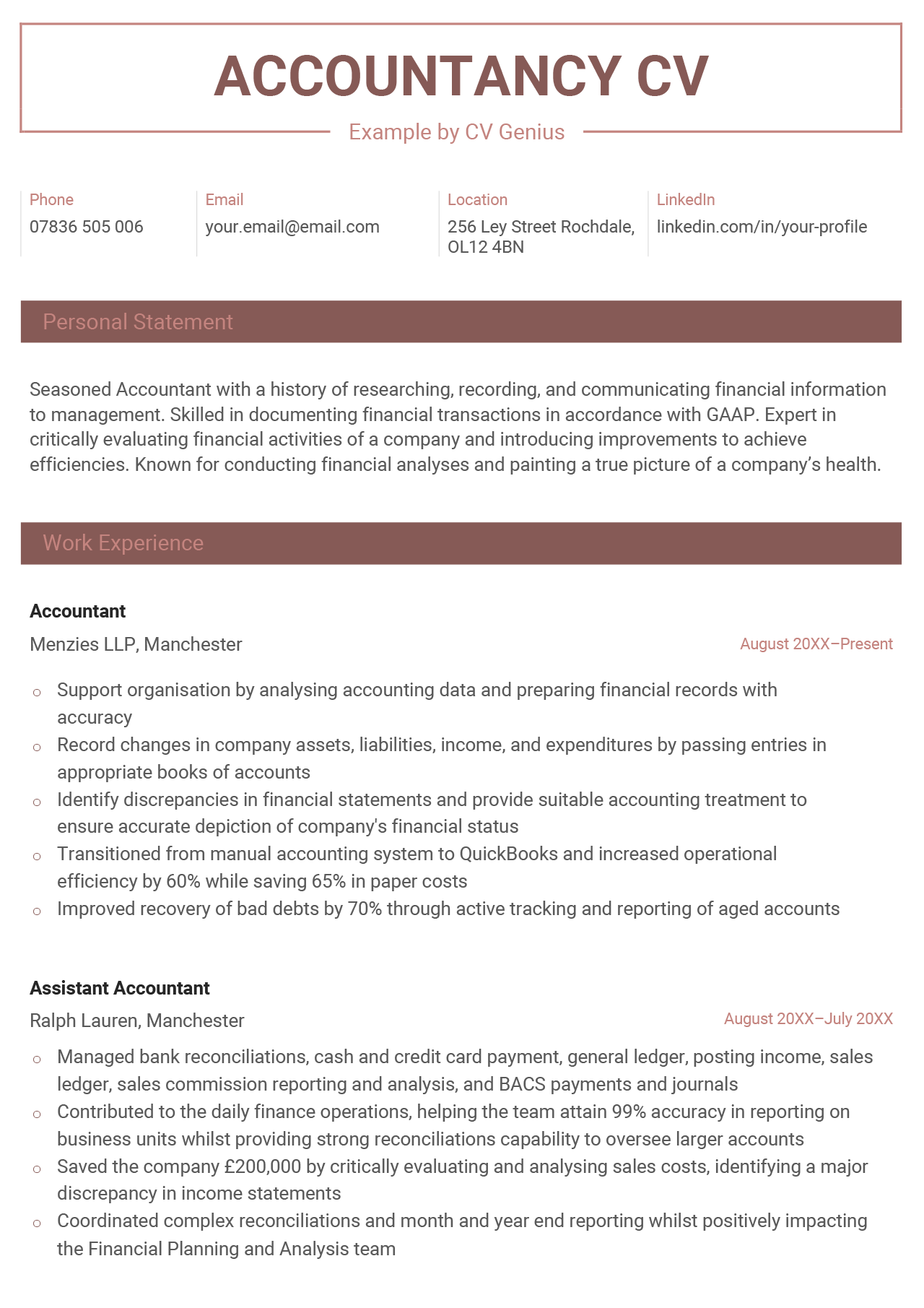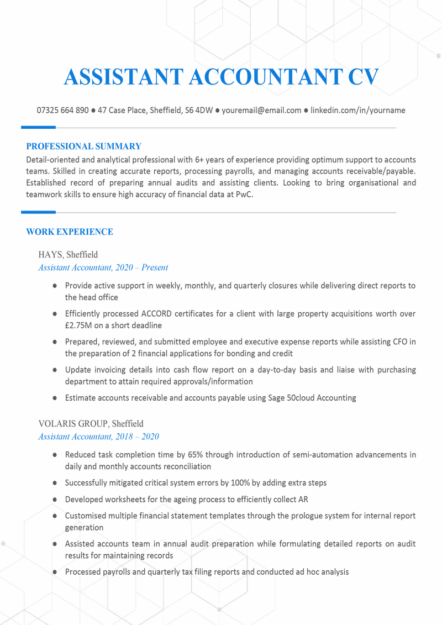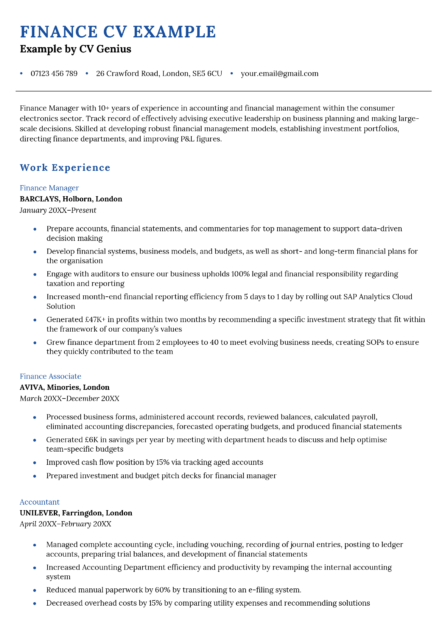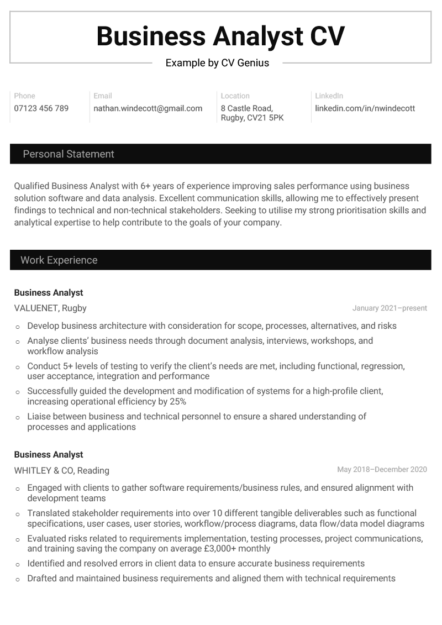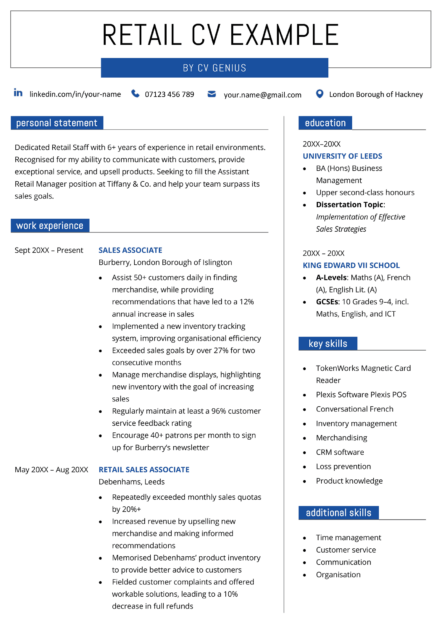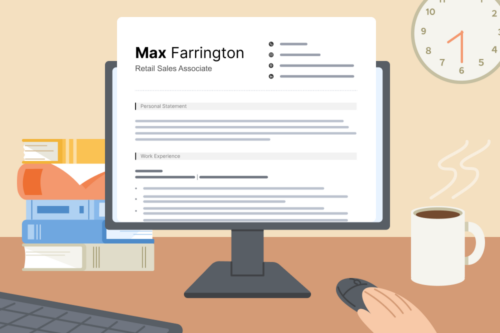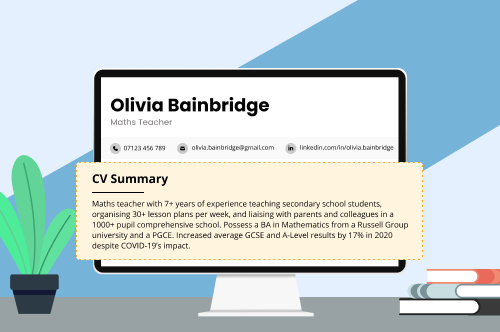Ensure your CV layout is structured to best highlight your unique experience and life situation.
Accountancy CV Template (Text Format)
PERSONAL STATEMENT
Seasoned Accountant with a history of researching, recording, and communicating financial information to management. Skilled in documenting financial transactions in accordance with GAAP. Expert in critically evaluating financial activities of a company and introducing improvements to achieve efficiencies. Known for conducting financial analyses and painting a true picture of a company’s health.
WORK EXPERIENCE
Accountant
Menzies LLP — Manchester
Aug 2018–Present
- Support organisation by analysing accounting data and preparing financial records with accuracy
- Record changes in company assets, liabilities, income, and expenditures by passing entries in appropriate books of accounts
- Identify discrepancies in financial statements and provide suitable accounting treatment to ensure accurate depiction of company’s financial status
- Transitioned from manual accounting system to QuickBooks and increased operational efficiency by 60% while saving 65% in paper costs
- Improved recovery of bad debts by 70% through active tracking and reporting of aged accounts
Assistant Accountant
Ralph Lauren — Manchester
Aug 2014–Jul 2018
- Managed bank reconciliations, cash and credit card payment, general ledger, posting income, sales ledger, sales commission reporting and analysis, and BACS payments and journals
- Contributed to the daily finance operations, helping the team attain 99% accuracy in reporting on business units whilst providing strong reconciliations capability to oversee larger accounts
- Saved the company £200,000 by critically evaluating and analysing sales costs, identifying a major discrepancy in the income statement
- Coordinated complex reconciliations and month and year end reporting whilst positively impacting the Financial Planning and Analysis team
Bookkeeper
Hays — Manchester
Jul 2008–Jul 2014
- Passed all financial entries, managed books of accounts, and maintained ledgers with 100% accuracy
- Identified and recorded all account inconsistencies and reported to company accountant for timely resolution
- Saved £35K for the company by removing inaccuracies from the payroll record
- Supported company accountant by maintaining up-to-date records, increasing efficiency of accounting systems by 63%+
- Introduced operational improvements and reduced bookkeeping time by 40%
EDUCATION
Bachelor of Arts, Accountancy
University of Manchester, Manchester
September 2005–April 2008
Relevant Modules
International Finance, Financial Analytics, Accounting and Taxation, Financial Planning and Management
KEY SKILLS
- Accounting cycle
- Reconciliations
- Accounts receivable/payable
- Financial reporting
HOBBIES & INTERESTS
- Cycling
- Cooking
- Yoga
How to write your accountancy CV
Before you begin writing, make sure you know how to write a CV in a way that best emphasises your strengths.
Companies rely on accountants to catch bookkeeping discrepancies and streamline budgets. Whether you’re in corporate finance or business recovery, you need a CV that accurately captures your expertise in working with numbers to get hired.
Land your next job interview by creating a competitive CV using an online CV maker, or if you have a bit more time, by following these four expert tips to write your accountancy CV from scratch:
1. Write an impactful personal statement
Start your accountant CV off strong by writing a powerful CV personal statement.
A personal statement is 2–4 sentences or bullet points at the top of your CV. This CV summary introduces you and spotlights your greatest strengths, experience, and achievements from your background in accounting.
Because of its prominent position, a personal statement can make or break your CV. So craft a statement that convinces an employer to read your CV more closely.
Use this space to show what:
- value you’ll bring to the company
- sets you apart from other accountants
Accounting CVs can be a little dry, so the personal statement also gives you a chance to show your personality. Add a descriptive adjective, outline your key traits, or state your professional values to make your CV more memorable.
This is an example of a good personal statement written for an accountancy CV:

2. Clearly list your qualifications
You’ve worked hard to earn your qualifications, so display them on your accountancy CV.
At a minimum, you should hold an Association of Accounting Technicians (AAT) qualification, which equips you for most accounting positions. Also list any extra certifications you have, including:
- Association of Chartered Certified Accountants (ACCA)
- Chartered Institute of Management Accountants (CIMA)
- Association of International Accountants (AIA)
If you’re pursuing a certain branch of accounting, you’ll also be expected to list the recognised qualifications for that speciality. For example, if you’re a Certified Public Accountant (CPA), include your Certified Public Accountants Association (CPAA) membership.
Still studying? If you’re in the process of completing an accountancy qualification, you can list it with your expected finish date on your CV. As it’ll be one of your most relevant qualifications, you should also present it using a professional CV template that lists your education section first.
If you have several certifications, you can create a designated certifications section on your CV. But if you hold just one or two certifications, slot them into your education section instead.
3. Add your top accountancy skills
Add a skills section to your accounting CV to highlight your unique skills on your CV. Accountants are expected to have a solid set of hard skills — technical skills learned through education or training.
Nowadays, it’s essential to show your proficiency in accounting software. List specific bookkeeping or organisational tools you’re comfortable working with. For example:
You should also be familiar with applying regulatory standards like the UK Generally Accepted Accounting Practice (GAAP) and HMRC tax compliance.
Strong data analysis skills are equally important. As an accountant, you’ll study financial patterns, identify trends, and make informed forecasts to save firms money.
Also fit hard skills like these abilities onto your accountancy CV — if you have them and they’re mentioned in the job advert:
- auditing
- accounts receivable/payable
- cost analysis
- financial reporting
- reconciliations
Although technical skills matter more than soft skills in accountancy, strong interpersonal skills are essential for communicating complex ideas in easy-to-understand ways. So give examples of your communication skills as well.
Tailor your skills to the job description. Read the job advert, circle relevant keywords, and then work these skills into your CV to show you’re a perfect fit for the role.
4. Show your accountancy expertise by using hard numbers
As an accountant, you crunch numbers every day. Now add those numbers to your accountancy CV too!
Back your skills and experience up with figures or percentages. By referring to this hard evidence, you’ll show the recruiter exactly what you’ve accomplished.
For example, state the percentage of profit you helped increase, or the amount of money you saved for a company. Doing so relates your skills to the impact you made.
Here’s an example accountancy CV work experience entry that uses hard numbers:
You can also use numbers to give context to your experience. State the size of the budgets you managed, for example, or the number of contracts you handled. Such parameters help employers understand the scale of your past work.
You’re also going to need a cover letter. Learn what a cover letter is (if you don’t already know), and then use a cover letter creator to create yours in minutes.
